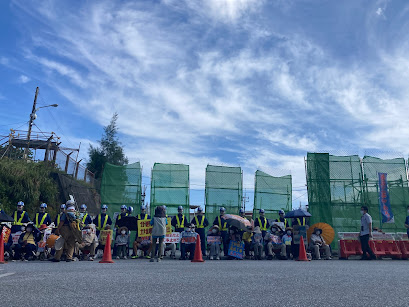OEJP's Statement on the Japanese Government's Approval by Proxy of Seafloor Reinforcement Work
Okinawa Environmental Justice Project's Statement on
the Japanese Government's Approval "by Proxy" of the Okinawa Defense Bureau's Proposed Seafloor Reinforcement Work for the Henoko Base Construction Project in Okinawa, Japan
The Okinawa Environmental Justice Project strongly condemns the Japanese government's approval "by proxy" of the Okinawa Defense Bureau's proposed seafloor reinforcement work for the Henoko base construction project in Okinawa, Japan. The OEJP calls on the Japanese and U.S. governments to cancel this democracy-undermining, unscientifically evaluated, environmentally destructive, militarily inept, reckless and discriminatory project against Okinawa: This project is destined to fail. The OEJP calls on the Japanese government to restore the environmental damage the project has caused. The OEJP calls on the Japanese and the U.S. governments to close the U.S. Marine Corps’ Futenma Air Station and establish a new plan to relocate the Futenma station outside of Okinawa. The OEJP is determined to continue its fight to stop the project and protect the environment of Henoko-Oura Bay in this Post-Execution by Proxy phase.
The Japanese Government's Approval "by Proxy"
On December 28, 2023, Tetsuo Saito, minster of the Land, Infrastructure, Transport, and Tourism of the Japanese government, approved "by proxy" the Okinawa Defense Bureau's proposed seafloor reinforcement work for the Henoko base construction project in Okinawa on behalf of Okinawa Governor Denny Tamaki and thus the people of Okinawa who elected him as our governor. The approval has enabled the Bureau to start seafloor reinforcement work, and the Bureau is expected to begin it on January 12, 2024.
Problems with the Government's Approval
The Japanese government's approval by proxy utterly undermines the principle of democracy. For more than 20 years, the people of Okinawa have opposed the Henoko base construction project by every democratic means possible, including elections, referendums, and non-violent direct actions. Governor Tamaki's relentless opposition to the base project epitomizes Okinawa's democratic voice.
The Japanese government's approval by proxy disregards the concerns expressed by the U.S. government and U.S. think tanks regarding the proposed base as a replacement for the U.S. Marine Corps’ Futenma Air Station. The U.S. Governmental Accountability Office has warned that the proposed runways are too short for proper operation. The U.S. military has also questioned the operability of the airbase sitting on a sinking seafloor. Given the project's uncertain completion time, the Henoko base appears to have fallen out of the U.S. military's strategic plans.
The Japanese government's approval by proxy underscores the Japanese government's discriminatory attitude toward Okinawa. This is the first time in Japan's history that the Japanese government used its power to execute by proxy against any prefectural government. Despite all these negative factors discussed above, the Japanese government did not hesitate to use this power against Okinawa. The government's discriminatory attitude is only matched by the profound recklessness of the project.
Our Fight Continues in the Post-Execution-by-Proxy Phase
The OEJP is determined to continue our fight to stop the Henoko base construction project and protect the environment of Henoko-Oura Bay in this Post Execution by Proxy phase. The strength of our struggle comes from our understanding that this project will fail because it is a democracy-undermining, unscientifically evaluated, environmentally destructive, militarily inept, reckless and discriminatory project. Collaborating with civil society members worldwide, the OEJP will reach out to and tell elected officials in Japan and the U.S., international experts, and international institutions about the recklessness and discriminatory nature of the project.
 |
| Image Source: The Asahi Shimbun |


